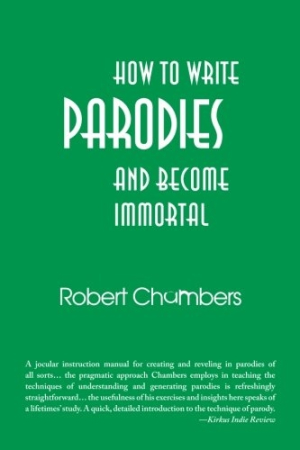How to Write Parodies and Become Immortal
Parody is everywhere today. From The Onion to The Colbert Report, from Saturday Night Live to The Office, people love to make fun of things. Robert Chambers, a decorated journalist and college literature teacher, gives readers How to Write Parodies and Become Immortal, a humorous companion piece that supplements and contrasts with his more serious book, Parody: The Art That Plays With Art. Through his new book, writers can learn the skills of the craft.
How to Write Parodies and Become Immortal is a highly educational how-to book that helps writers of all stripes create funny, pointed parodies. Chambers asserts that most of us are born parodists. His goal is to “restore the kind of childhood parodic invention that was once a virtually automatic part of your verbal and histrionic arsenal.”
In this volume, Chambers offers genuine instruction in a sarcastic, self-deprecating tone. He focuses on simple spoof parodies, and he organizes the book around the three major variations of parody: banging, binding, and blending. This approach lends structure to playfulness—and vice versa. The author explains key terms, discusses the importance of contrasting comedic elements, and shows how to add variations and iterative details within each type of parody.
Chambers fleshes out common writing aphorisms like “write what you know” for parody writers. “Select raw and bloody chunks from your own miserable Life Story,” he suggests, “the more grotesque and humiliating the better, because these are the choicest candidates for the parodic assembly line.” Statements such as this exemplify the unity between Chamber’s tone and his instruction.
The book is chock full of illustrative examples of parody, though some are dated (a fact the author admits in the introduction). The book also contains a surprising number of useful charts, diagrams, and worksheets to help writers organize and envision their work. Readers also get the added benefit of a special section on poetry.
In the introduction, Chambers explains how this book came to be: He had wanted to include this instructional material in his last book, but his editor chose otherwise. Between the particulars of that story, the satirical subject matter, and the occasionally pedantic tone, it sometimes feels like Chambers is writing for himself more than anyone else, which can be off-putting in an instructional book.
Chambers undoubtedly knows his subject matter and has sought to delve intelligently into an often-dismissed genre. Readers who want to write well-crafted parodies will benefit from his instruction and find this book downright humorous and educational.
Reviewed by
Melissa Anne Wuske
Disclosure: This article is not an endorsement, but a review. The publisher of this book provided free copies of the book and paid a small fee to have their book reviewed by a professional reviewer. Foreword Reviews and Clarion Reviews make no guarantee that the publisher will receive a positive review. Foreword Magazine, Inc. is disclosing this in accordance with the Federal Trade Commission’s 16 CFR, Part 255.

